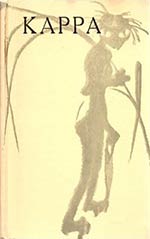
![]() charlesdee
charlesdee
1/19/2015
![]()
To the extent that Ryunosuke Akutagawa is known at all in the U.S., it is probably from the credit scroll to Akira Kurosawa's classic film Rashomon. Akutagawa wrote the two short stories Kurosawa based the film on. In Japan, Akutagawa (1892 - 1927) is considered the father of the modern Japanese short story, and one of Japan's most prestigious literary awards bears his name. Akutagawa published haiku under a pseudonym and short stories that ranged from retellings of classic medieval tales to stories of his contemporary milieu to supernatural tales. His discomfort with the changes modernizing Japan informs much of his fiction and along with his chronic illnesses led to his suicide at the age of thirty-four.
"The Kappa" is one of his longer and more lighthearted stories. Its satire of Japanese society is much in the vein of Jonathan Swift's Gulliver's Travels. The narrator is Patient No. 23 in the S. Mental Hospital at the X. Village in a Tokyo suburb. Some years before the narrative begins, he was hiking a familiar mountain trail when he encountered a Kappa. Kappa are among the Yokai of Japanese folklore -- mischievous, sometimes helpful, sometimes dangerous forest spirits. They take many forms. One is woman with a snakelike neck. Another is a girl with long hair who hides behind the wardrobe. There is also a rambunctious umbrella. Kappas are river creatures with beaks and a distinctly fishy odor.
The Kappa our narrator encounters leads him on a chase up the mountain until the young man falls into a hole and loses consciousness. When he comes to he is in the land of the Kappa, a society that matches Japan in much of its structure but is supremely strange in other ways. The most disturbing custom he encounters is the Kappa's cannibalistic solution to unemployment. Fortunately for him, the Kappa emjoy human visitors. He is treated well and becomes a sort of local celebrity. When his homesickness for human society becomes too great, he learns that returning is not all that difficult. But upon his return he finds himself in a mental hospital.
The Kappa is one of Akutagawa's most accessible stories for Western readers. It's a good if slightly misleading introduction to his much darker and more complex work.
http://www.potatoweather.blogspot.com